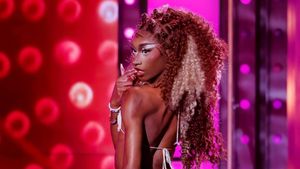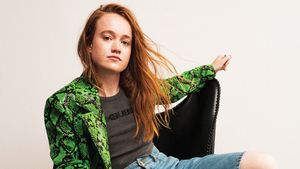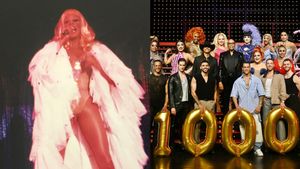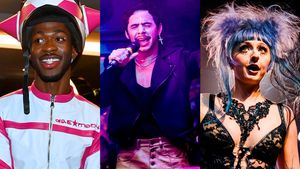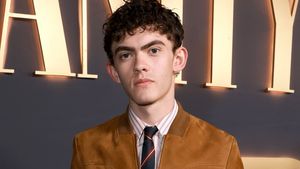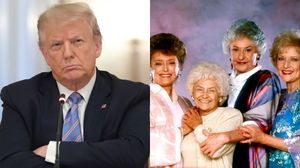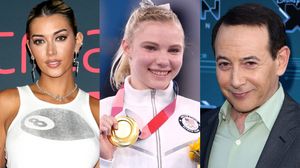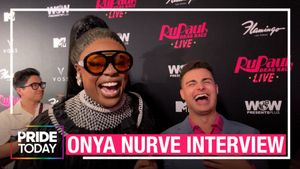There is no one quite like Brittney Griner.
As she describes herself in her memoir, In My Skin, the basketball phenom was all elbows and knees as a kid. She knew that she didn't like wearing dresses, or ooh-ing and ahh-ing over the boys in her class, as her friends did.
At some point between elementary school and the unavoidable hell that is middle school, the other kids picked up on her differences, too. Then her shyness morphed into brazenness and she created a sort of protective shell. She felt no choice but to act out in her classes, which got her in trouble. If she wasn't mouthing off to a teacher to impress the other kids, she was defending herself against throngs of classmates in the girl's bathroom who were looking for a fight, or others who would physically taunt her for her tall, thin body. Those actions (and defenses) landed her an embarrassing phone call a teacher made in front of her class to Griner's tough-as-nails father, and a stint at a reform school.
Eventually, Griner found refuge in sports. She played volleyball, but found the clothing much too revealing. She was skilled in soccer, but a high school coach saw something in her and encouraged her to play hoops. With some refinement, Griner soon became a local star -- you may have first seen her in the 2007 viral video "High School Girl Dunker." The bullying subsided just enough.
"The more I improved as a player, the better I felt about the person I was becoming," she wrote in her book. "It all just fed on itself. After fighting and struggling my way through middle school, I now had a new sense of purpose."
Griner may have gotten into basketball late, but she tells The Advocate she still immediately sought young female athletic role models who were LGBT, especially in her own sport.
Of course there was basketball legend Sheryl Swoopes, who played right in Griner's hometown of Houston, and then there's Lisa Leslie, whose off-court style and on-court tenacity could be a template for Griner. But back then there wasn't anyone who Griner could relate with or aspire to become -- a black woman living openly, without any apologies, while playing a team sport at the top of her game.
Women's athletics -- especially team sports -- seem to have had an unwritten rule that Griner is helping to shatter: women can be athletes, but only if they remain non-threatening and attractive to straight men. For so long, that meant lesbians could only be quietly out; and they had better wear lipstick and ponytails. It meant you could be out on the college team, but not so out that it worries the parents of a potential freshman hot shot, who might pick another school sheerly out of homophobia. These unwritten rules kept coaches and athletes in the closet from the pee-wee level, all the way to college and the pros.
That's why Griner's example means so much, no matter how unsure or insecure she might have felt deep down inside. She's making an example for anyone who feels different. She is done hiding who she is after having to do so while playing at Baylor University, a Christian school in Waco, Texas with policies in place that condemn homosexuality.
At only 23, Griner is consciously taking the helm as a role model for kids -- particularly LGBT kids and girls -- who are different.
Does Griner like looking great off the court? Of course she does. But she's not putting on an evening gown to do so. Griner had found that she likes style on her own terms: bowties, T-shirts, Chuck Taylors, skinny jeans, a skateboard. Her tattoos tell her story of beauty and strength. Her swagger, which she said was initially exaggerated in her teenage years, has simplified and become an extension of her natural -- and still building -- confidence.
Whether it's through her book or social media, Griner is proof that no one should have to compromise themselves to be liked, or to play on a team, or even to be part of a family. Her goal is to inspire young people to feel empowered through their differences, and for parents to become allies to their children when they're being bullied.
"I know there are younger kids and teens that are going through the same things that I went through, coming out, and kind of finding themselves," Griner says. "I wanted to write my memoir so I could show them I was there, I made it through, even when I was at my lowest moments. I still pushed through and I made it. When I was growing up I really didn't have a role model in sports who came out early in their career -- to give me hope."
Griner hid a lot of her personal struggles from her parents. She describes her father as supportive, but tough and stoic. And even to this day, she never wanted to worry her mother with her problems. But she warns parents out there that they should always be diligent about watching for signs of bullying in their kids, and then to get involved right away.
"It's easy for a parent to tell their kid to talk to the principal, but so many times when students do, nothing really changes," she says. "I've seen it a lot of times -- nothing happens. Especially when someone from the LGBT community is being bullied, they overlook it, or they see it as 'kids being kids,' but it's much more serious than that."
Griner was bullied for years, but she escaped through writing and playing basketball. And after a shaky start in her 2013 rookie season with the Phoenix Mercury and a season playing in China, Griner's hot off the WNBA All-Star game, and part of a championship-bound team that celebrates her on and off the court, along with veterans Candice Dupree, and Diana Tarausi.
With all the glory as a college hoops star at Baylor, and now on a professional team, Griner is using her platform as one of the most transformative players in women's basketball to be open about who she is, and to give the Baby Griners out there an inkling of hope that their differences can be strengths.
"A lot of time," she says, "you hear people talk about the LGBT community, and they put us in, like, our own classification, our own group of society, and they're like, 'How do we handle them?' But we're just like anyone else who laces up their shoes, and plays on the court or the ice or the field."
This is one of eight profiles that The Advocate released this week for the annual "40 Under 40" list. From now through Friday, August 8, readers are asked to vote on who you think should be on The Advocate's digital edition cover. Then the remaining 32 honorees will be released in August along with the new cover. Go to Facebook to vote now!



















